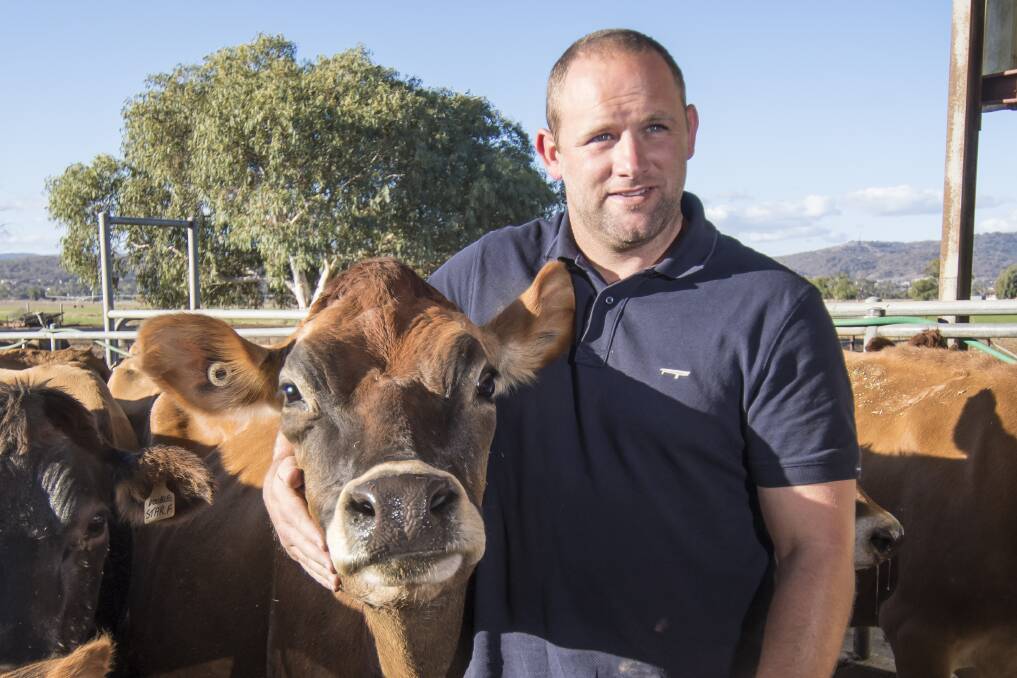
FLIES dart around Todd Wilson’s head on a crisp winter’s day as he steps into his dairy.
Subscribe now for unlimited access.
or signup to continue reading
It’s unusual to see so many flies this time of year, the Westdale farmer said.
Unusual, however, has come to be expected, these days.
“We’ve got a little creek that comes through the front of our property,” Mr Wilson said.
We’ve been here for 18 years now on this farm and it’s definitely the worst we’ve ever seen it.
- Dairy farmer Todd Wilson
“And there’s one other time I’ve seen it completely dry, normally it goes down to a little puddle.”
Last time it dried out on Mr Wilson’s watch, more than 10 years ago, a drenching rain fell two days later.
“It has been completely dry for just over two months,” he said.
The Wilson family took the reins of Peel Valley Milk, late last year.
Sick of the “price wars within the dairy industry”, they made a huge call and became processors.
“It was a big call, but, so far it’s been worth it,” he said.
It has been worth it in a number of ways.
Mr Wilson just returned from Sydney where a few people are interested in getting more Peel Valley Milk served in the city.
“Demand was going up and we’re having a lot more out-of-town interest as well, which is good,” he said.
Worth it? Certainly.
Has it been challenging?
“Extremely.
“I was talking to a couple of older guys the other day and the ‘65 drought was the worst one ever and they’re saying this sort-of matches that,” he said.
“I know for us, we’ve been here for 18 years now on this farm and it’s definitely the worst we’ve ever seen it.”
It has been an accumulation of factors which have led to this outstanding and unusual dry spell.
“Probably more so because it’s been a fair while since we’ve had a really good spring or a really good downpour,” he said.
“Which is probably why this drought has been a little bit harder than what some of the previous ones have been.
“It’s been such a long time since we had any kind of relief.”
From baby calves, right through to our older cows there’s 600 head and every single animal is hand-fed.
- Todd Wilson
There was a sense of what 2018 was going to throw-up in terms of conditions, even with some preparation, it has pushed coping measures into new territory.
“We had, compared to other years, excess fodder stored,our sheds were all full of hay, we had plenty of silage,” he said.
“We had more than enough to get us through an average year.”
2018 has not been average.
“That finished a few weeks ago so we, well-and-truly, used all of that fodder and now it’s all brought in,” he said.
“From baby calves, right through to our older cows there’s 600 head and every single animal is hand-fed.
“We’ve probably had to do that previously; it probably hasn’t been brought-in feed for this long a period of time.”
READ MORE:
The conditions proffered at the moment mean more has to be packed in to the working day.
“I guess as most farmers would be aware it’s probably not the easiest time of the year to get out of bed nice and early because of it’s little bit colder and it’s dry too,” he said.
“The drought brings a different stress element into most farmer’s lives.
“We spend probably about eight hours a day feeding animals.
“We milk in the dairy three hours of a morning and three hours of a night, then eight hours feeding and you’ve got all the rest of your farm work to do too.”
He said buying local was important at this time, across all farming industries and products and guessed it would take years to recover from the drought bearing down presently.
How else could people help the situation?
“Pray for rain.”


